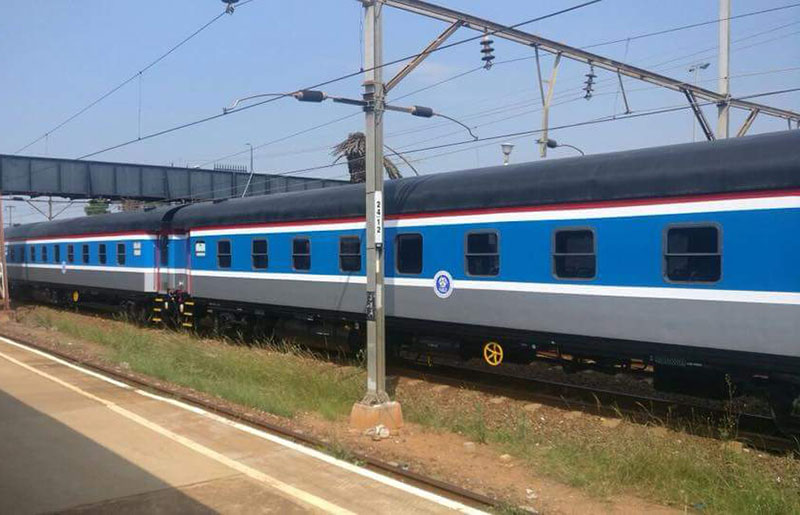NRZ revenues hard hit by Covid-19
THE National Railways of Zimbabwe (NRZ) has in the first half of the year lost over $1,6 billion in potential revenue from across its different customers due to the adverse effects of Covid-19.
NRZ offers bulk freight services to energy, mining, agriculture, and other commercial sectors.
The parastatal’s board chairman Advocate Martin Dinha who was in Bulawayo over the weekend, said that NRZ has been hard hit by the Covid-19 pandemic.
“NRZ lost business previously budgeted for in 2021 due to serious Covid-19 effects on customer operations, global markets slow down due to declining mineral prices, delayed finalisation of greenfield investments, change of Treasury priorities towards health care affecting support to imports of grains and fuels, declining disposable incomes also affected fuel demand.
“The total loss for the half year of 2021 is $1,659 billion,” he said.
Recently, the Confederation of Zimbabwe Industries (CZI), which represents the manufacturing sector has said the growth in industrial output in the second quarter of this year would depend largely on the impact of Covid-19, power supply, access to forex and inflation.
In its 2021 first quarter business survey, CZI forecasts that average capacity utilisation could close the year at 56 percent down from the earlier projection that industrial capacity may hit a post-dollarisation high of 61 percent.
Adv Dinha said during the first quarter ended March 31, 2021, NRZ lost $516,4 million in potential revenue while $1,143 billion was lost in the second quarter on account of the Covid-19 pandemic’ direct and multiplier effects.
Last year, the rail company moved 2,5 million tonnes of cargo down from 2,8 million tonnes a year earlier and the dip in freight volume was largely been attributed to the detrimental impact of the Covid-19 pandemic.
This year NRZ was targeting to move 4,5 million tonnes of cargo.
“The country is already experiencing the Covid-19 third wave as illustrated by the surge in national statistics on covid-19 positive cases and deaths. This will also continue to affect NRZ operations.
“In view of the above, and in order to ensure rail is adequately positioned to play its part in the movement of bulk commodities, and to make grains and foodstuffs affordable to consumers, consideration must be given to assisting NRZ to administer vaccines at NRZ nominated clinics for its employees and the necessary training be given to the nursing staff.
“This will go a long way in reducing man-hours lost due to long periods of quarantine and also reduce the chances of deaths due to the virus.
“At the same time, the organisation will also be playing its part towards achieving herd immunity,” said Adv Dinha.
Since the first outbreak of the Covid-19 in the country in March last year, NRZ has recorded 69 cases and seven deaths with 29 recoveries.
“A total of 388 contacts were quarantined for 14 days (lost time hours) thus affecting production. Covid-19 is giving financial pressure on NRZ through procurement of essential Covid-19 resources required to control the epidemic.
The Covid-19 induced lockdowns affected production through employee lost time.”
He said NRZ is handicapped financially to acquire RAT (Rapid Antigen Testing) kits for Covid-19 although it has 16 clinics dotted throughout the country which can carry out testing.
As a result, this has seen employees put on quarantine for 14 days when a case is detected in a workplace.
“NRZ was not nominated by Ministry of Health and Child Care and local authorities as a vaccination post although it has clinics, doctors, nurses and public health practitioners who can drive the vaccination programme.
“NRZ employees are highly mobile and this can be a vehicle for disease transmission,” said Adv Dinha.
On the business front, the NRZ board chair said loading and offloading of wagons by customers has affected the turnaround time thus affecting supply and this is occasioned by lockdown rules.
He said some customers have now moved over to road that has quicker turnaround times and this has affected revenue inflows.
“Train crew utilisation has become problematic as train crews are now reluctant to go into book-off quarters for fear of Covid-19. They now prefer round trip working to avoid Covid-19 hotspot areas.
“Some customers deny NRZ employees into their premises by demanding current Covid-19 free certificates,” said Adv Dinha.
In March 2020, NRZ suspended passenger services following the outbreak of Covid-19 in the country, a situation that has also closed the firm’s revenue stream.
“Passenger services would have been a super spreader for Covid-19 if such measures were not taken.
“Decongestion of workplaces has seriously affected production. Our employees use public transport to and from work thus exposing them to Covid-19 and there is general fear and anxiety amongst employees and this affects production,” he said.-herald.l.zw









